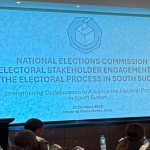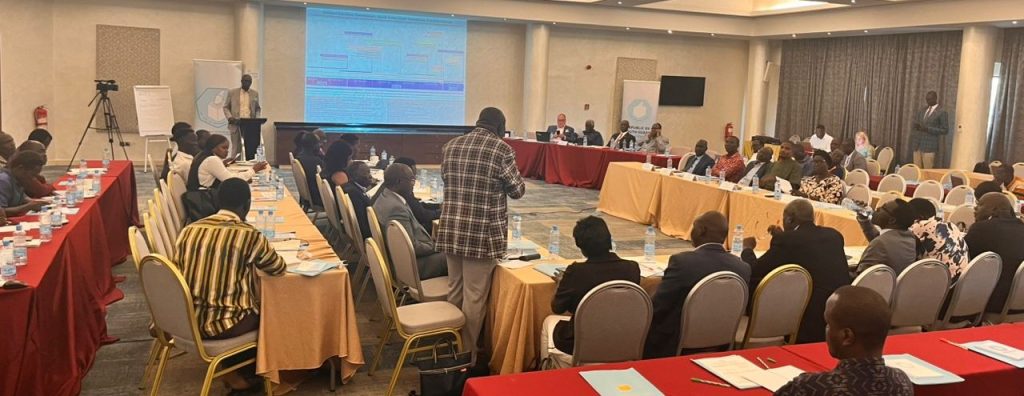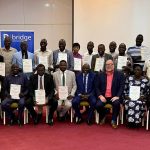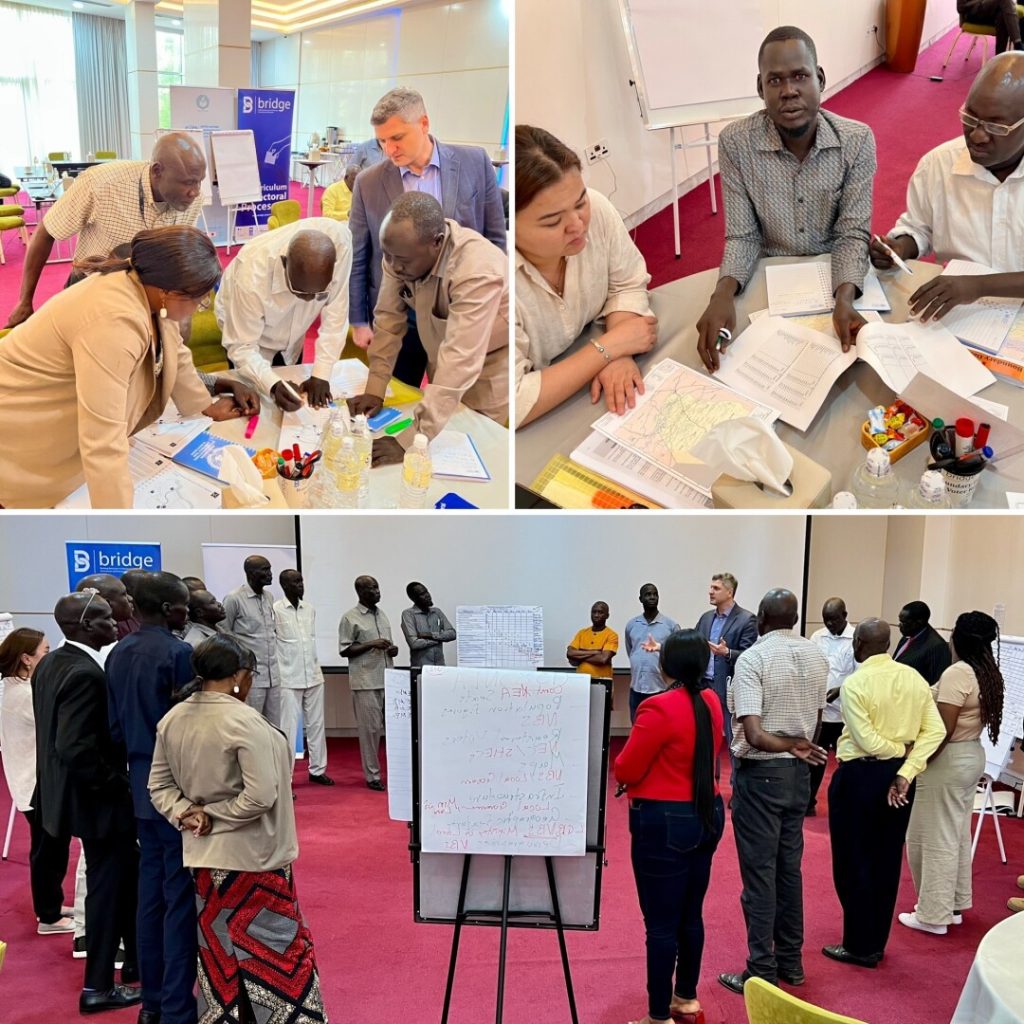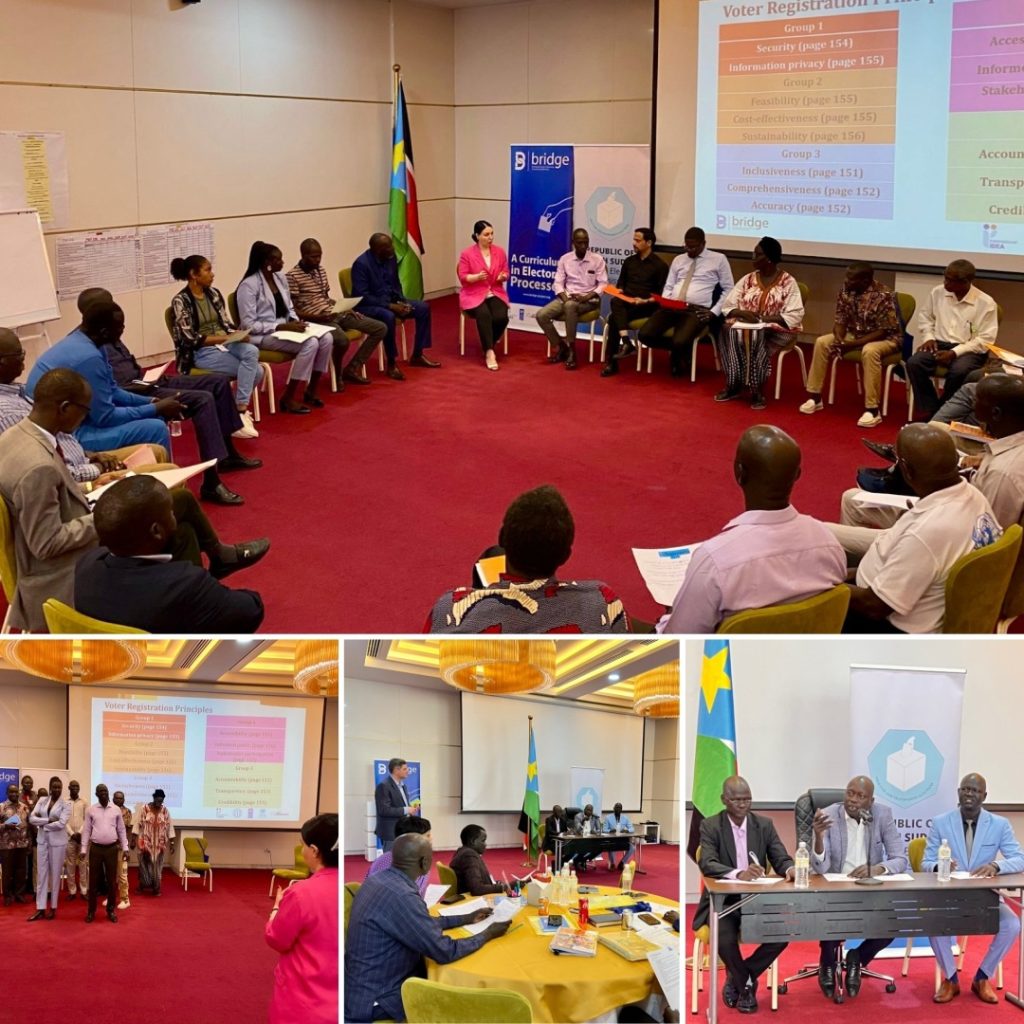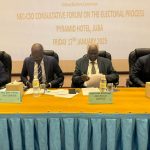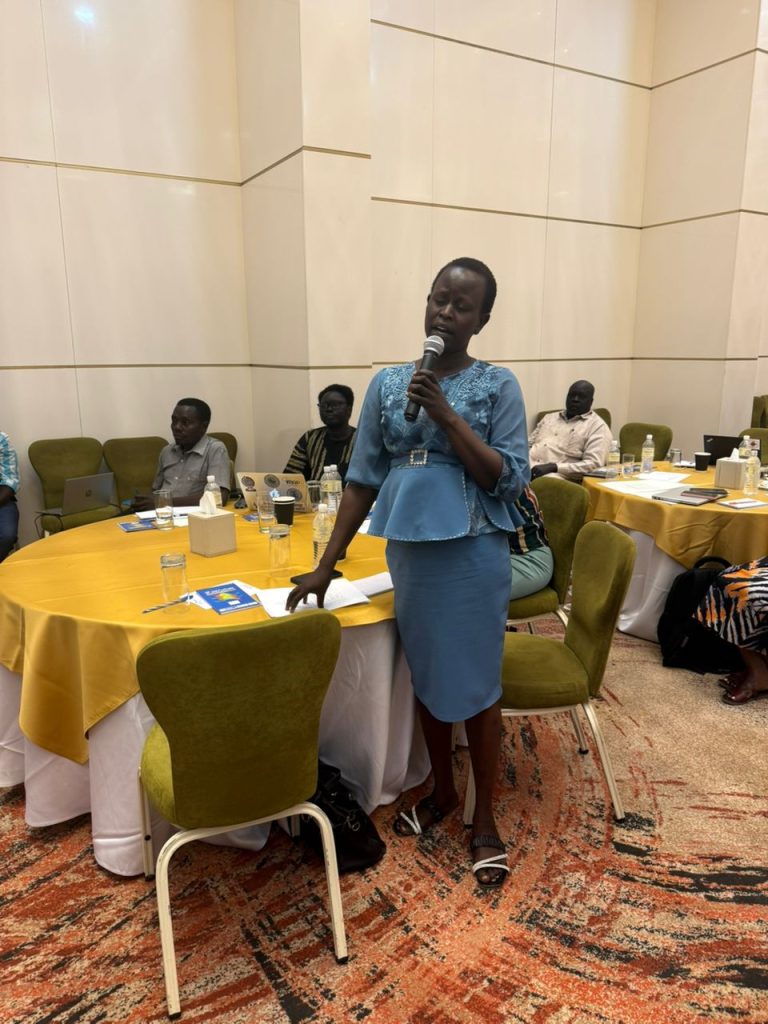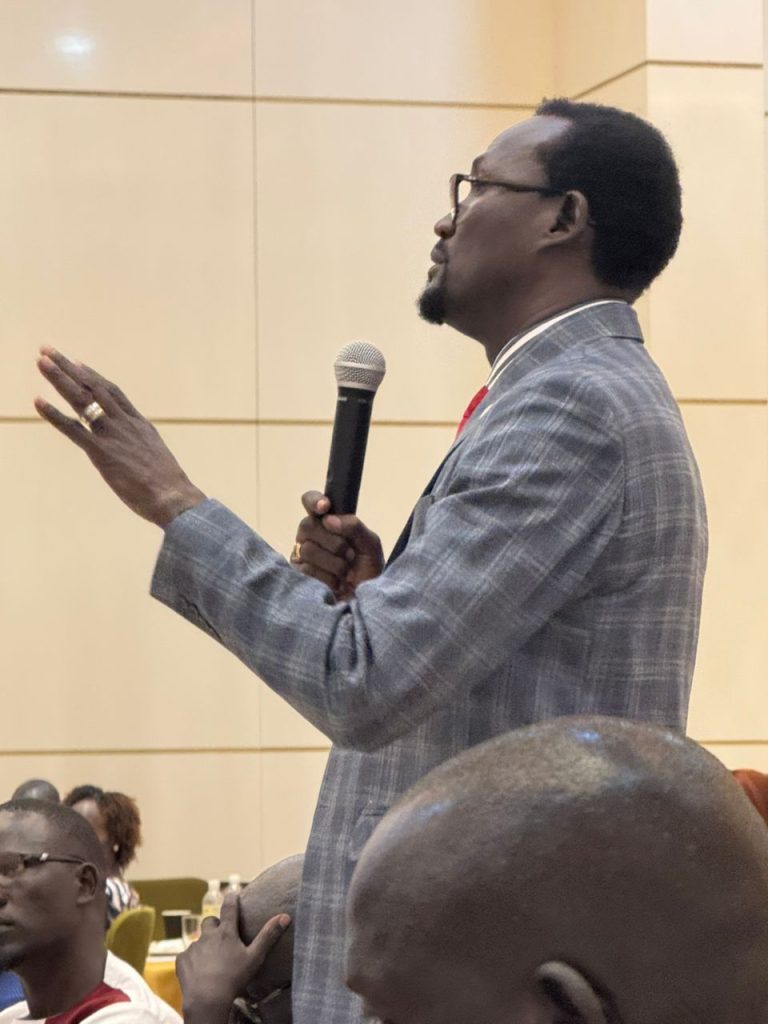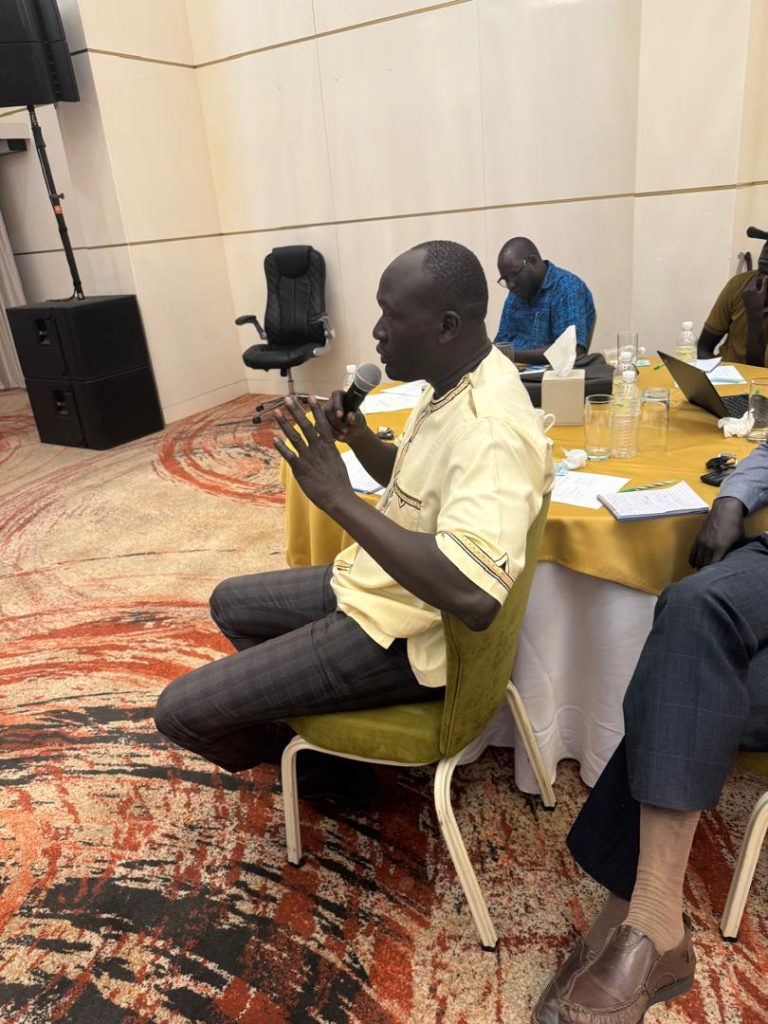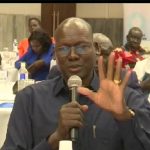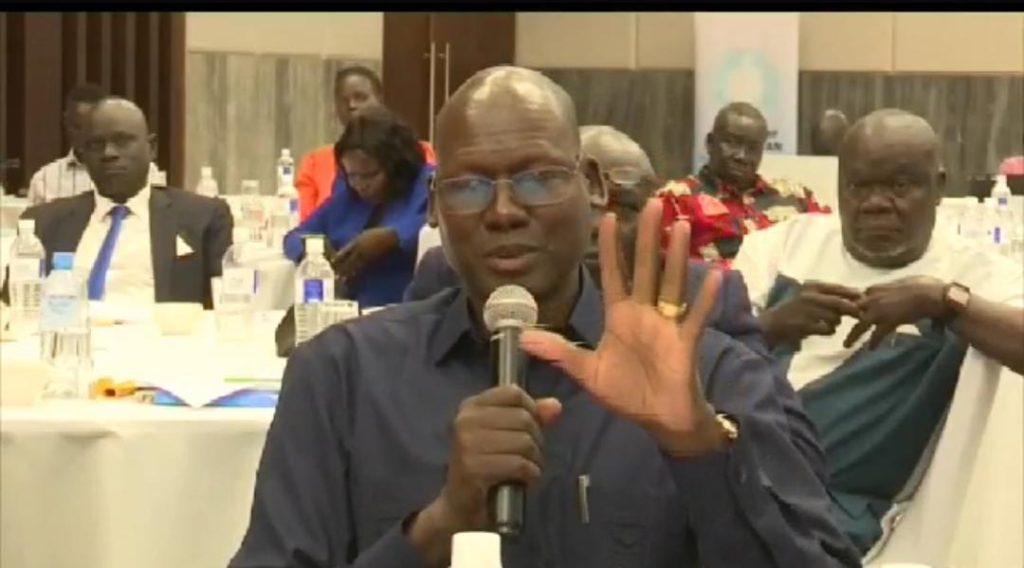Press Statement of the Chairperson of the National Elections Commission of the Republic of South Sudan
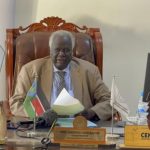
On 22nd December 2025 at the National Elections Commission HQs Office – Juba
On the Declaration of the National Geographical Constituencies for the December 2026 General Elections in the Republic of South Sudan
Prof. Abednego Akok Kacuol
Chairperson
National Elections Commission (NEC)
Chairperson
National Elections Commission (NEC)
In reference to the decision made by the parties to the Agreement (R-ARCSS) on 10th December 2025 to delink the conduct of a new population Census and Constitution-making process as a pre-conditions for the conduct of General Elections in December 2026 and in accordance with the National Elections Act 2012 (Amendment) Act, 2023, section 4(1)(e) & (f) that gave the NEC powers to revert the country to use the constituencies of the 2010 General Elections for the upcoming December 2026 elections in the Republic of South Sudan.
Henceforth, the National Elections Commission hereby declares the 102 constituencies in accordance with the ten (10) States and the Three Administrative Areas as summarized follows:
1. Central Equatoria State (CES) has fourteen (14) National Constituencies.
2. Eastern Equatoria State has eleven (11) National Constituencies.
3. Western Equatoria State has eight (8) National Constituencies.
4. Jonglei State has seventeen (17) National Constituencies including Greater Pibor Administrative Area.
5. Unity State has seven (7) National Constituencies including Ruweng Administrative Area.
6. Upper Nile State has twelve (12) National Constituencies.
7. Lakes State has eight (8) National Constituencies.
8. Northern Bahr El Ghazal State has nine (9) National Constituencies.
9. Western Bahr El Ghazal State has four (4) National Constituencies.
10. Warrap State has twelve (12) National Constituencies including Abyei Administrative Area.
Thereafter, as per the section 41(1)(g) the public shall know the names and other details of the constituencies on the official website of the National Elections Commission and in the print media.
We thank all the media houses for coming to make the coverage of this press conference on the electoral process.
God bless the Republic of South Sudan.
Click link below to download the signed pdf version of the Press Statement:
https://nec.gov.ss/download/the-geographical-constituencies-for-the-national-legistlative-assembly/
The 102 Geographical Constituencies for National Legislative Assembly of the Republic of South Sudan for all Ten (10) States and Three Administrative Areas:
Central Equatoria State – Fourteen (14) Constituencies – National Legislative Assembly Seats
| Constituency | Boundary Description | Residential Units |
| Juba North Constituency No. 1 | Juba Town Payam | |
| Juba South Constituency No. 2 | Kator Payam, Rejaf Payam | |
| Munuki Constituency No. 3 | Munuki Payam | |
| Juba West Constituency No. 4 | Rokon Payam, Dolo Payam, Tijor Payam, Wonduruda Payam, Lobonok Payam, Bangui Payam & Ganzi Payam | |
| Juba East Constituency No. 5 | North Bari Payam, Mangalla Payam, Lokilliri Payam & Lirya Payam | |
| Yei Town Constituency No. 6 | Yei Payam | |
| Yei West Constituency No. 7 | Tore Payam & Lasu Payam | |
| Yei South Constituency No. 8 | Mugwo Payam & Otogo Payam | |
| Kajokeji West Constituency No. 9 | Kangapo 2 Payam & Liwolo Payam | |
| Kajokeji Town Constituency No. 10 | Lire Payam, Kangapo 1 Payam & Ngepo Payam | |
| Terekeka East Constitueny No. 11 | Terekeka Payam, Muni Payam, Nyori Payam, Gemeza Payam & Tombek Payam | |
| Terekeka West Constituency No. 12 | Tali Payam, Tindilo Payam, Rijong Payam & Rego Payam | |
| Morobo Constituency No. 13 | Gulumi Payam, Kimba Payam, Lujulo Payam, Wudabi Payam & Panyume Payam | |
| Lainya Constituency No. 14 | Kenyi Payam, Mukaya Payam, Kupera Payam & Wuji Payam |
Eastern Equatoria State – Eleven (11) Constituencies – National Legislative Assembly Seats
| Constituency | Boundary Description | Residential Units |
| Torit Constituency No. 1 | Torit, Hiyala, Ifwotu & Himodoge | |
| Lafon Constituency No. 2 | Burgilo, Kurumi, Marguna & Pachidi | |
| Lopa Constituency No. 3 | Arihilo, Imehejek, Lohutok & Longiro | |
| Kapoeta North Constituency No. 4 | Chumakori, Karukomuge, Lomeyen, Mosingo, Najie & Paringa | |
| Kapoeta East 1 Constituency No. 5 | Katodori, Kauto & Lotimor | |
| Kapoeta East 2 Constituency No. 6 | Jie, Mogos, Narus, Natinga & Lohuro | |
| Kapoeta South Constituency No. 7 | Kapoeta Town, Longeleya, Machi, one Machi Two & Riwoto | |
| Budi Constituency No. 8 | Kimotong, Komari, Loriyok, Lotuke, Loudo, Nagishot & Napak | |
| Ikotos Constituency No. 9 | Haitire, Ikotos, Imotong, Lomohidang North, Lomohidang South & Losite | |
| Magwi Constituency No. 10 | Magwi, Pajok & Lobone | |
| Pageri Constituency No. 11 | Nimule, Mugali & Pageri |
Jonglei State – Seventeen (17) Constituencies – National Legislative Assembly Seats
| Constituency | Boundary Description | Residential Units |
| Old Fangak Constituency No. 1 | Old Fangak County | Old Fangak all Payams |
| Pigi (Khorflus) Constituency No. 2 | Pigi County | All Payams of Pigi |
| Ayod North Constituency No. 3 | Ayod North | Pagiel, Korwai, Mogok, Ayod & Kuacdeng |
| Ayod South Constituency No. 4 | Ayod South | Wau & Pajiek |
| Akobo North Constituency No. 5 | Akobo North | Barmach, Buong, Walgak, Diror & Dengjok |
| Akobo South Constituency No. 6 | Akobo South | Bilkey, Alali & Nyandit |
| Nyirol Constituency No. 7 | Nyirol | All Payams of Nyirol |
| Uror North Constituency No. 8 | Uror North | Karam, Motot & Pathai |
| Uror South Constituency No. 9 | Uror South | Puolchuol, Uror, Pieri, Payai & Tiam |
| Twic East Constituency No. 10 | Twic East County | All Payams of Twic East |
| Duk Constituency No. 11 | Duk county | All Payams |
| Bor Athoc Contituency No. 12 | Bor South | Jalle & Baidit |
| Bor South Centre Constituency No. 13 | Bor South | Bor Town & Makuach |
| Bor Gok Constituency No. 14 | Bor Gok | Anyidi & Kolnyang |
Pibor Administrative Area
| Constituency | Boundary Description | Residential Units |
| Pochalla Constituency No. 15 | Pochalla | All payams of Pochalla |
| Pibor West Constituency No. 16 | West Pibor | Lekuangole & Gumuruk |
| Pibor East Constituency No. 17 | Pibor East | Pibor, Vertet, Marow, Buma, Kiziongora & Miwono |
Unity State Seven (7) Constituencies – National Legislative Assembly Seats
| Constituency | Boundary Description | Residential Units |
| Rubkona Constituency No. 1 | All payams of Rubkona | |
| Guit Constituency No. 2 | All Payams of Guit | |
| Mayendit Constituency No. 3 | All Payam of Mayendit | |
| Mayom Constituency No. 4 | All payams of Mayom | |
| Leer Constituency No. 5 | All payams of Leer |
Ruweng Administrative Area
| Constituency | Boundary Description | Residential Units |
| Pariang Constituency No. 6 | Aliiny, Biu, Jamjang, Nyeel, Pariang, Werthen & Wunkur | |
| Abiemnon Constituency No. 7 | Abiemnon, Aworpiny, Manjoga & Panyang |
Lakes State Eight (8) Constituencies – National Legislative Assembly Seats
| Constituency | Boundary Description | Residential Units |
| Cueibet Constituency No. 1 | Boundaries of Cueibet County | Cueibet Town, Mayath, Abiriu, Ngap, CitCok, Tiap Malou Pec Pagor & Duony |
| Rumbek North Constituency No. 2 | Boundaries of Rumbek North County | Aloor, Madol, Malueth, Maper, Mayen, Wun-Riang, Malek & Mayom, Tiap |
| Rumbek Centre Constituency No. 3 | Boundaries of Rumbek Centre | Among Piny, Matangai and Rumbek Town |
| Wulu Constituency No. 4 | Boundaries of Wulu County | Bargel, Domoloto, Makundi & Wulu |
| Rumbek East Constituency No. 5 | Boundaries of Rumbek East | Akot, Atiaba, CueiCok, Maleng-Agok Pacong, Paloch, Aduel & Mathian |
| Yirol West Constituency No. 6 | Boundaries of Yirol West County | Abang, Aluakluak, Annuol, Geng-Geng, Geer Mapuordit & Yirol centre |
| Yirol East Constituency No. 7 | Boundaries of Yirol East County | Adior, Lekakedu, Malek, Pagarau, Tinagau & Yali |
| Awerial Constituency No. 8 | Awerial, Abuyuong, Bun-agok, Dor, Magok, Puluk, Nile, Alel 1, Alel 2, Mingkaman |
Western Equatoria State Eight (8) Constituencies – National Legislative Assembly Seats
| Constituency | Boundary Description | Residential Units |
| Mundri Town Constituency No. 1 | Amadi, Bangolo, Kotobi, Mundri | |
| Mvolo Town Constituency No. 2 | All Payams of Mvolo | Bagori, Barh El Grindi, Dari, Mvolo, Lessi, Kokori & Yeri |
| Maridi Town Constituency No. 3 | All Payams of Maridi | Kozi, Landili, Mambe, Maridi & Ngamunde |
| Ibba Town Constituency No. 4 | Boundaries of Ibba county | Ibba Centre, Madebe, Manikakara, Maruko & Nabanga |
| Yambio Town Constituency No. 5 | All payams of Yambio | Bangasu, Gangura, Lirangu or Rirangu, Nadiangere & Yambio Town |
| Nzara Town Constituency No. 6 | All payams of Nzara County | Basukangbi, Nzara centre, Ringasi, Sakure & Sangua |
| Ezo Town Constituency No. 7 | All payams of Ezo | Andari, Bagidi, Bariguna, Ezo centre, Naandi & Yangiri |
| Tambura Town Constituency No. 8 | Boundaries of Tambura County | Mupoi, Namutina, Source Yubu & Tambura |
Northern Barh El Ghazal State Nine (9) Constituencies – National Legislative Assembly Seats
| Constituency | Boundary Description | Residential Units |
| Gokmachar Constituency No. 1 | Malual Centre, Ariath, Malual East, Malual North & Malual West | |
| Korok Constituency No. 2 | Wath thok, Mayen Uleu, Mabior Anguei & Malual West | |
| Abiem East Constituency No. 3 | Madhol, Malual Baai, Makuac kier, Mayom wel & Malith alek yai | |
| Abiem Centre Constituency No. 4 | Wanyjok, Malual kon, Baac Akuei, Warawar & Wunlang | |
| Abiem west Constituency No. 5 | Yargot, Malou kuac, Wunding & rumakeer | |
| Aweil South Constituency No. 6 | Malek Alel, Tiar-aliet, Gakrol, Panthou & Ayai | |
| Awiel Town Constituency No. 7 | Maper akot, Malou aweer, Navasha, New site, Central Market, Zira-toc and salam, & Mathiangdit and Gabat | |
| Cimel and Gomjuer Constituency No. 8 | Udhum, Maduany, Mariam, Gomjuer, Weat Wiel & Nyamlel | |
| Ayat and Majak Constituency No. 9 | Majak-baai, Marial-baai, Akuany kuac, Nyinbuoli & Majook Dengdit |
Western Barh El Ghazal State Four (4) Constituencies – National Legislative Assembly Seats
| Constituency | Boundary Description | Residential Units |
| Raga Centre Constituency No. 1 | Consist of whole areas of Raga county including Bagari payam, Besselia Payam & Kpaile payam | |
| Wau South Payam Constituency No. 2 | Consist of Wau South payam, Roc roc, Dong Payam & Kuajena Payam | |
| Marial Bai Payam Constituency No. 3 | Consist of Marial bai payam, Wan bai payam, Udici payam & Kangi payam | |
| Wau North Payam Constituency No. 4 | Consist of Wau North payam, Marial Agieth & Bar Yar |
Warrap State Twelve (12) Constituencies – National Legislative Assembly Seats
| Constituency | Boundary Description | Residential Units |
| Abyei and Twic Constituency No. 1 | Ameth-aguok, Alel, Rumameer, Mijak, Abyei, Ajak-kuac, Aweng, Turali | |
| Twic Constituency No. 2 | Aweng & Turali | |
| Twic Constituency No. 3 | Akoc & Pan-Nyok | |
| Twic Constituency No. 4 | Turali and Wunrok | |
| Gogrial West Constitueny No. 5 | Akon North, Akon South, Alek West & part of Alek North | |
| Gogrial West Constituency No. 6 | Aleth North, Aleth South & Riau | |
| Gogrial West and Gogrial East Constituency No. 7 | Kuac North, Kuac South & Nyang | |
| Gogrial East Constituency No. 7 | Pathuon East, Pathuon, Toch East, Toch West & Toch North | |
| Tonj North Constituency No. 9 | Awuul, Man-loor, Pagol, Kirik & Warrap | |
| Tonj North Constituency No. 10 | Akop, Marial-lou, Rual-bet, Aliek & Alabek | |
| Tonj East Constituency No. 11 | All the Payams of Tonj East County | |
| Tonj South Constituency No. 12 | Tonj Town, Malual muok & Agugo |
Upper Nile State Twelve (12) Constituencies – National Legislative Assembly Seats
| Constituency | Boundary Description | Residential Units |
| Malakal Ogot Constituency No. 1 | Ogot Payam in the IRIO payam in the Eastern Malakal payam | Ogot Payam, Northern Malakal Payam, Lelo Payam, Eastern Payam & central |
| South Malakal Panyikang Constituency No. 2 | Southern Malakal is in the North, Anakdiar in the east, Dhothem, Pakang and Panyikang payam in the west and Tonga payam in the south | Anakdiar payam, Panyidway payam, Dhothem payam, Pakany payam, panyikang payatli, Tonga Payam and Southern Malakal payam |
| Renk Geiger Constituency No. 3 | Geiger in the North, Renk Payam in the South & Nile River to the West | Geiger Payam, North Renk Payam, South Renk payam |
| Maban constituency No. 4 | Maban County | Jelhsk payam, Chemedi payam, Banashowa Payam, Bouny payam, Jirkuata payam, Jinmakda payam & Khor El Amer |
| Nasir-Dingkar Constituency No. 5 | All payams | Dingkar Payam, Nasir Payam & Roam Payam |
| Kiechkuon-Mading Constituency No. 6 | Mading payam of Kiechkuon payam | Mading payam, Kiechkuon |
| Kuereng-Ke Constituency No. 7 | Kuereng-ke south Jikmir north Payam | Kuereng-ke payam, Jikmir |
| Malut and Baliet Constituency No. 8 | All payams of the two places | Bimachuk, Goldora, Melut, Paloch, Wunamum, Panamdit, Viikuel, Abwong, Adorn, Akoka, Akotweng, Rom, Nyong Kuach, Nyongrial & Wunthow |
| Fashoda and Manyo Constituency No. 9 | Fashoda & Manyo areas | Megenis payam, Wadakona payam, Kaka Payam, Athidhwoi payam, Detwok payam, Kodok payam & Lul payam |
| Maiwut Constituency No. 10 | All boundaries of Maiwut | Jekou Payam, Jetome payam, Kijiel payam, Maiwut payam, Oleng payam & Pagak payam |
| Ulang Constituency No. 11 | All Ulang boundaries | Doma payam, Kur-muot payam, Yomding payam & Ulang payam |
| Longuchuk Constituency No. 12 | All boundaries of Longuchuk | Dajo payam, Guelguk payam, Longuchuk payam, Malual payam, Pamach payam & Wudiet payam |
